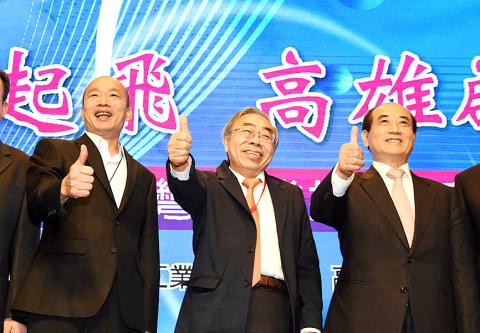Kaohsiung Mayor Han Kuo-yu (韓國瑜) on Wednesday said that he would not be meeting Chinese Nationalist Party (KMT) Chairman Wu Den-yih (吳敦義) before April 17, derailing the leadership’s plan to avoid a contentious presidential primary.
To be able to draft Han as its uncontested candidate, the KMT needs to obtain his consent prior to April 17, when the party is scheduled to announce the rules and schedule of the presidential primary.
Han had publicly refused the party’s offer on multiple occasions.

Photo: Chang Chung-yi, Taipei Times
Although Wu earlier that morning told reporters that he was to have a face-to-face conference with Han today, multiple sources said that Han declined and offered to meet Wu after April 18, when he returns from a trip to the US.
KMT spokesman Ouyang Lung (歐陽龍) confirmed the reports on the sidelines of a meeting of the KMT Central Standing Committee on Wednesday afternoon, saying Han had conveyed his intentions to KMT Vice Chairman Tseng Yung-chuan (曾永權).
Ouyang added that the party has not arranged for a meeting between Wu and Han when Wu visits Kaohsiung tomorrow.
Asked about Han’s response, Wu said that he was still trying to persuade the Kaohsiung mayor.
“The party intends to nominate the most popular and capable candidates for the presidential and legislative elections next year,” Wu said.
Wu is to confer with the party’s presidential hopefuls to hammer out an agreement about Han’s nomination.
He is to meet former New Taipei City mayor Eric Chu (朱立倫) on Sunday, KMT Legislator Wang Jin-pyng (王金平) on Monday and former Taipei County commissioner Chou Hsi-wei (周錫瑋) on Tuesday.
Asked about the meeting with Wu, Chu’s office yesterday issued a statement saying that Chu hoped the meeting would be held in public.
Chu fully supports the KMT leadership in its efforts, whether it is to draft Han or to hold a primary election and, as such, he has nothing to discuss with Wu, the office said.
Additional reporting by Ke Yun-hao and Chen Yun

A Ministry of Foreign Affairs official yesterday said that a delegation that visited China for an APEC meeting did not receive any kind of treatment that downgraded Taiwan’s sovereignty. Department of International Organizations Director-General Jonathan Sun (孫儉元) said that he and a group of ministry officials visited Shenzhen, China, to attend the APEC Informal Senior Officials’ Meeting last month. The trip went “smoothly and safely” for all Taiwanese delegates, as the Chinese side arranged the trip in accordance with long-standing practices, Sun said at the ministry’s weekly briefing. The Taiwanese group did not encounter any political suppression, he said. Sun made the remarks when

The Taiwanese passport ranked 33rd in a global listing of passports by convenience this month, rising three places from last month’s ranking, but matching its position in January last year. The Henley Passport Index, an international ranking of passports by the number of designations its holder can travel to without a visa, showed that the Taiwan passport enables holders to travel to 139 countries and territories without a visa. Singapore’s passport was ranked the most powerful with visa-free access to 192 destinations out of 227, according to the index published on Tuesday by UK-based migration investment consultancy firm Henley and Partners. Japan’s and

BROAD AGREEMENT: The two are nearing a trade deal to reduce Taiwan’s tariff to 15% and a commitment for TSMC to build five more fabs, a ‘New York Times’ report said Taiwan and the US have reached a broad consensus on a trade deal, the Executive Yuan’s Office of Trade Negotiations said yesterday, after a report said that Washington is set to reduce Taiwan’s tariff rate to 15 percent. The New York Times on Monday reported that the two nations are nearing a trade deal to reduce Taiwan’s tariff rate to 15 percent and commit Taiwan Semiconductor Manufacturing Co (TSMC, 台積電) to building at least five more facilities in the US. “The agreement, which has been under negotiation for months, is being legally scrubbed and could be announced this month,” the paper said,

Japan and the Philippines yesterday signed a defense pact that would allow the tax-free provision of ammunition, fuel, food and other necessities when their forces stage joint training to boost deterrence against China’s growing aggression in the region and to bolster their preparation for natural disasters. Japan has faced increasing political, trade and security tensions with China, which was angered by Japanese Prime Minister Sanae Takaichi’s remark that a Chinese attack on Taiwan would be a survival-threatening situation for Japan, triggering a military response. Japan and the Philippines have also had separate territorial conflicts with Beijing in the East and South China